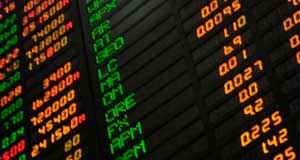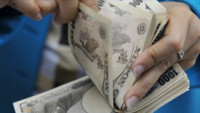 Yesterday’s slide in equity markets was notable for a number of reasons, concerns about Europe’s banks, and Deutsche in particular, the outcome of this week’s OPEC meeting, as well as some jitters ahead of the first debate between Presidential hopefuls Donald Trump and Hillary Clinton, which took place overnight.
Yesterday’s slide in equity markets was notable for a number of reasons, concerns about Europe’s banks, and Deutsche in particular, the outcome of this week’s OPEC meeting, as well as some jitters ahead of the first debate between Presidential hopefuls Donald Trump and Hillary Clinton, which took place overnight.
With some polls showing Trump narrowly in front and with just over 40 days to the vote, investors may well need to face up to the possibility that Trump might win, particularly since Clinton hasn’t shown any signs whatsoever of being able to sustain any clear blue water in the polling numbers.
Last night’s debate was the first opportunity to see the two candidates go head to head and judging by some of the market reaction Donald Trump would appear to have come off second best, which means that we could well see European markets open higher after yesterday’s sharp sell-off. Certainly his comments about not paying his taxes are unlikely to go down particularly well with either side, though it is equally true that with these debates we find out little that we didn’t already know about either candidate.
If there is one thing the last few years of turmoil in financial markets has taught us it’s that confidence is a fragile concept and where banks are concerned it is doubly so.
Even financially sound banks can become vulnerable if investors doubt their ability to continue doing business, and where a bank’s financial situation is particularly fragile, as in the case of Deutsche Bank, then politicians and regulators need to tread carefully.
Concerns around Germany’s biggest bank are well documented given this month’s announcement of a potential $14bn fine from the US Department of Justice, at a time when the bank is struggling to return to profitability, as well as restructure its overall business.
Knowing all of this, the timing of weekend reports that the German government is leaning in the direction of letting Deutsche fend for itself, later reinforced by comments from Hans Michelbach the head of the German Bundestag finance committee, once again raised concerns about the fragility of Europe’s banking system.
His comments that any sort of state aid was inconceivable while understandable also completely misreads the gravity of the situation Deutsche Bank currently finds itself in. There is a distinct probability the bank may well have to raise extra capital and given current circumstances who in their right minds would look to do that given current concerns.
The alternative is to cut costs further and with Commerzbank also announcing the loss of 9,000 jobs this week, 18% of its work force, it’s not a pretty picture for the German banking sector.
While politics is undoubtedly a factor given the banking problems in Italy and the weariness that voters have with respect to banking bailouts a year before German elections, politicians need to weigh up what the possible scenarios might be.
German politicians have been particularly insistent that Italy deals with its problem banks without using taxpayer’s money, and by bailing in depositors and bondholders if necessary.
In being so insistent they have backed themselves into a cul-de-sac of their own making, particularly if they choose to adopt different rules for their own largest and systemically important bank.
Markets got a taste of the turmoil unleashed in the aftermath of Lehman Brothers and it wasn’t anywhere near as systemically important as Deutsche Bank is, which means there is no way to accurately measure what any ripple out effects might be, if investors lose confidence even more and Germany leaves the bank to its fate.
Ultimately the German government may have to decide if they can afford not to bail it out, if any resultant turmoil plunges Europe back into recession.
EURUSD – the euro has rallied for four days in succession with the potential for a move towards the 1.1300 area initially, and even the June highs above 1.1400. Solid support remains near the 1.1120 area, with a move below targeting the 1.1000 area.
GBPUSD – the pound has managed to hold above the 1.2900 level for now, with a potential break targeting the July lows just below 1.2800. We need a rebound through the 1.3120 level to stabilise, and break the cycle of weakness.
EURGBP – the euro retested the previous highs at the 0.8720 area and has thus far held below. While below we could slip back towards the 0.8620/30 area. A break through the 0.8730 area targets a potential move towards 0.8800.
USDJPY – continues to look weak with a retest of the 99.50 lows a distinct possibility. While below the 103.00 area the prospect of a move through 99.50 towards 96.00 remains.













